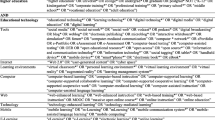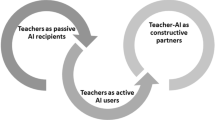Abstract
The two case studies reported in this article contribute to a better understanding of how inquiry tasks and activities are employed as resourceful means for learning in higher professional education. An observation-based approach was used to explore characteristics of and challenges in students’ participation in collaborative inquiry activities in two first-year introductory courses in teacher and computer engineering education. The findings highlight that the students’ activities varied with regard to focus and structure and were shaped by the types of inquiry tasks, i.e. case analysis and project-based work, by how the inquiry process was guided and supported and the way the domain-specific knowledge resources and practices were introduced. An exploratory strategy and rather confined use of resources characterised the teacher education students’ inquiry, while collaborative programming, a trial-and-error approach and extensive use of external resources that of the engineering education students’. For the teacher students, the main challenge was to construct meaning of conceptual knowledge and to integrate different forms of knowledge as a lens for analysing practice. The computer engineering students experienced challenges with unpacking the underlying principles and knowledge black-boxed in the widely available resources. The article suggests that future research and curriculum designs should depart from a more refined understanding of inquiry as a learning means, by connecting inquiry activities to the specific knowledge domains, the type of tasks most suited to explore each of this domains and the challenges that may arise for students.
Similar content being viewed by others
Notes
Transcription conventions:
[…] : Utterances removed from the original dialogue
… utterance : Start of quoted excerpt
utterance… utterance : Short pause in speech
utterance…. : End of quoted excerpt. The original group discussion continues
(text) : Non-verbal actions registered in the recording
[text] : Author’s comments to the original text
References
Aditomo, A., Goodyear, P., Bliuc, A.-M., & Ellis, R. (2013). Inquiry-based learning in higher education: principal forms, educational objectives, and disciplinary variations. Studies in Higher Education. doi:10.1080/03075079.2011.616584.
Ball, D. L., & Forzani, F. M. (2009). The work of teaching and the challenge for teacher education. Journal of Teacher Education, 60(5), 497–511.
Billett, S., & Choy, S. (2014). Integrating professional learning experiences across university and practice settings. In S. Billett, C. Harteis, & H. Gruber (Eds.), International handbook of research in professional practice-based learning (pp. 485–511). Dordrecht: Springer International.
Braun, V., & Clarke, V. (2006). Using thematic analysis in psychology. Qualitative Research in Psychology, 3(2), 77–101.
Brew, A. (2010). Imperatives and challenges in integrating teaching and research. Higher Education Research and Development, 29(2), 139–150.
Damşa, C. I. (2014). The multi-layered nature of small-group learning: productive interactions in object-oriented collaboration. International Journal of Computer-Supported Collaborative Learning. doi:10.1007/s11412-014-9193-8.
Damşa, C.I. & Nerland, M. (2014). Analysing students’ inquiry-oriented work as epistemic practice. In T. Fenwick, Proceedings from the ProPEL Conference 2014. Stirling, UK: University of Stirling
Eilam, B., & Poyas, Y. (2009). Learning to teach: enhancing pre-service teachers’ awareness of the complexity of teaching-learning processes. Teachers and Teaching: Theory and Practice, 15(1), 87–107.
Grossman, P., Hammerness, K., & McDonald, M. (2009). Redefining teaching, re-imagining teacher education. Teachers and Teaching: Theory and Practice, 15(2), 273–289.
Havnes, A., & Smeby, J.-C. (2014). Professional development and the profession. In S. Billett, C. Harteis, & H. Gruber (Eds.), International handbook of research in professional and practice-based learning (pp. 915–944). Dordrecht: Springer.
Heywood, J. (2014). Conclusion: engineering at the crossroads. Implications for educational policy makers. In A. Johri, & B. M. Olds (Eds.), Cambridge handbook of engineering education research (pp. 731–748). New York: Cambridge University Press.
Hmelo-Silver, C. E. (2004). Problem-based learning: what and how do students learn? Educational Psychology Review. doi:10.1023/B:EDPR.0000034022.16470.f3.
Jensen, K., Lahn, L., & Nerland, M. (2012). Professional learning in the knowledge society. Rotterdam, The Netherlands: Sense Publishers.
Jones, A. (2009). Re-disciplining generic attributes: the disciplinary context in focus. Studies in Higher Education, 34(1), 85–100.
Klette, K., & Carlsten, T. C. (2012). Knowledge in teacher learning: new professional challenges. In K. Jensen, L. C. Lahn, & M. Nerland (Eds.), Professional learning in the knowledge society (pp. 27–48). The Netherlands: Sense Publishers.
Knorr-Cetina, K., & Reichman, W. (2015). Professional epistemic cultures. In I. Langemeyer, M. Fischer, & M. Pfadenhauer (Eds.), Epistemic and learning cultures – wohin sich universitäten entwickeln (pp. 46–60). Weinheim: Beltz Juventa.
Levy, P., & Petrulis, R. (2012). How do first-year university students experience inquiry and research, and what are the implications for the practice of inquiry-based learning? Studies in Higher Education, 37(1), 85–101.
Levy, P., Aiyegbayo, O., & Little, S. (2009). Designing for inquiry-based learning with the learning activity management system. Journal of Computer Assisted Learning. doi:10.1111/j.1365-2729.2008.00309.
Litzinger, T., & Lattuca, L. (2014). Translating research to widespread practice in engineering education. In A. Johri, & B. M. Olds (Eds.), Cambridge handbook of engineering education research (pp. 375–392). New York: Cambridge University Press.
Mackenzie, A. (2006). The performativity of code: software and cultures of circulation. Theory, Culture & Society, 22(1), 71–92.
Markauskaite, L., & Goodyear, P. (2014). Professional work and knowledge. In S. Billettt, C. Harteis, & H. Gruber (Eds.), International handbook of research in professional and practice-based learning (pp. 79–106). Dordrecht: Springer.
Meirink, J. A., Meijer, P. C., Verloop, N., & Bergen, T. C. (2009). How do teachers learn in the workplace? An examination of teacher learning activities. European Journal of Teacher Education, 32(3), 209–224.
Muukkonen, H., Lakkala, M., Kaistinen, J., & Nyman, G. (2010). Knowledge creating inquiry in a distributed project management course. Research and Practice in Technology-Enhanced Learning. doi:10.1142/S1793206810000827.
Nerland, M. (2008). Knowledge cultures and the shaping of work-based learning: the case of computer engineering. Vocations and Learning, 1, 49–69.
Nerland, M., & Jensen, K. (2014). Changing cultures of knowledge and professional learning. In S. Billett, C. Harteis, & H. Gruber (Eds.), International handbook of research in professional and practice-based learning (pp. 611–640). Dordrecht: Springer.
Prince, M., & Felder, R. (2006). Inductive teaching and learning methods: definitions, comparisons, and research bases. Journal of Engineering Education, 2, 123–138.
Säljö, R. (2010). Digital tools and challenges to institutional traditions of learning: technologies, social memory and the performative nature of learning. Journal of Computer Assisted Learning, 26, 53–64. doi:10.1111/j.1365-2729.2009.00341.x.
Schulman, L. S. (2005). Signature pedagogies in the professions. Dædalus, 134(3), 52–59.
Spronken-Smith, R. (2012). Experiencing the process of knowledge creation: The nature and use of inquiry-based learning in higher education. The Journal of Geography in Higher Education, 2, 183–201.
Spronken-Smith, R., Walker, R., Batchelor, J., O’Steen, B., & Angelo, T. (2011). Enablers and constraints to the use of inquiry-based learning in undergraduate education. Teaching in Higher Education. doi:10.1080/13562517.2010.507300.
Van Bommel, M., Boshuizen, H. P. A., & Kwakman, K. (2012). Appraising the qualities of social work students’ theoretical knowledge: a qualitative exploration. Vocations and Learning, 5, 277–295. doi:10.1007/s12186-012-9078-9.
Yin, R. K. (2013). Case study research, design and methods (5th ed., ). Newbury Park, CA: Sage.
Acknowledgments
We thank the reviewers for their constructive comments and the ExCid research group at the Faculty of Education, University of Oslo for the useful feedback on the manuscript.
Author information
Authors and Affiliations
Corresponding author
Ethics declarations
Grant Support
This research is conducted as part of the project Horizontal Governance and Learning Dynamics in Higher Education, funded by the Research Council of Norway under the FINNUT programme (2012–2016), grant no. 212,285.
Rights and permissions
About this article
Cite this article
Damşa, C.I., Nerland, M. Student Learning Through Participation in Inquiry Activities: Two Case Studies in Teacher and Computer Engineering Education. Vocations and Learning 9, 275–294 (2016). https://doi.org/10.1007/s12186-016-9152-9
Received:
Accepted:
Published:
Issue Date:
DOI: https://doi.org/10.1007/s12186-016-9152-9




